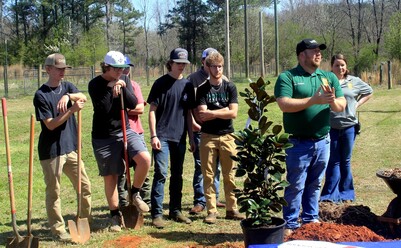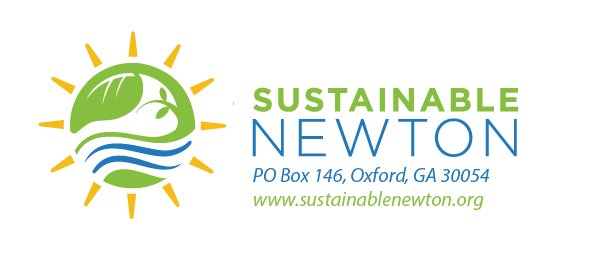|
By Dr. Marcus Pollard, Agricultural Educator & Young Farmer Advisor with Newton College & Career Academy  Dr. Marcus Pollard with students from the Newton College & Career Academy & Eastside High School Eco Eagles (Photo Credit: Dr. Lois N. Upham) Dr. Marcus Pollard with students from the Newton College & Career Academy & Eastside High School Eco Eagles (Photo Credit: Dr. Lois N. Upham) Speaking from the lens of one of the agricultural education teachers at Newton College & Career Academy, we are consistently looking to connect things. We strive to connect our students with curriculum, our curriculum with industry, and our industries with students. Ultimately that’s what sustainability is, right? Connecting things with one another? Webster defines sustainable as : capable of being sustained. Well, what does Webster say about sustained? “Maintained at length without interruption or weakening." That’s what I’m talking about. I don’t want our student’s progress to be interrupted, and I certainly don’t want it to be weakened. I want the experiences our students have to strengthen them as individuals, therefore strengthening our curriculum and local industries. Much like any type of braided wire or rope, we believe the more experiences we can connect with a student, the stronger that student becomes. Our students hopefully become more sustainable when they come through our program. Sustainability is really our approach with everything in our agricultural education program. We have a lot of different projects. You’ll hear us reference the school farm in a lot of different ways. Sometimes we say Ag Campus. Other times we say Blue & Gold Acres. The blue and gold stems from our Career and Technical Student Organization (CTSO is the acronym used in education circles), which is the FFA. Long ago, it used to be referenced as the Future Farmers of America. That often invoked an image of an elderly man, in overalls, on an old tractor, chewing on some straw. That image wasn’t sustainable for the future of our program. So, now for better or worse, the name is simply the National FFA Organization. Connecting to Learn A lot of our projects connect with each other. We have lots of livestock that includes cows, pigs, sheep, goats, and chickens. We have an apiary with around six bee hives. We have an aquaponics lab. We have a growing worm/compost bin. We have an agricultural mechanics lab with a CNC plasma machine. We have welding booths. We have a tractor with several implements. We have a zero turn mower. We have a saw mill where we make our own lumber. We have a fruit orchard. We have a hay field that the kids planted in rye grass. We are creating an arboretum of trees native to Georgia. We have a lot of stuff. And that means our kids have access to a lot of stuff. It also means a lot of work to keep it up, running, and effective. We try to connect those projects as much as possible. The plant scraps from aquaponics are used in the worm compost bin. The manure from the livestock is used as fertilizer in our fruit orchard and arboretum. The goats are utilized around campus to graze on weeds. The bees obviously benefit the fruit orchard and arboretum. The kids in Ag Mechanics are constantly making repairs to our facilities. The students use the saw mill to make lumber for projects and raised beds that are going out to other schools and in the community. Connecting with Industry These projects are also connected with industry. Arbor Equity brings us trees that have been removed from local properties, and we use them on our saw mill. Otherwise, they would wind up in our landfill. Little Springs Farm offers advice on our cattle operation and sells our excess sausage from our pigs that we process. Covington Veterinary Clinic offers assistance with many of our veterinary needs with our livestock. Snapping Shoals EMC uses our sheep at their solar farm to help graze underneath the solar panels. Georgia Wiggler’s Worm Farm helps us out with the worm bin composting. Hays Tractor helps us with all of our tractor needs. Mayfield Ace and Social Circle Ace have helped us out with numerous small engine projects. Sustainable Newton assisted with the planting of a Magnolia tree on our campus. I could go on and on with the support we get locally. I’m also proud to say that many of these organizations have hired former students as their employees. It all comes full circle. We’re very fortunate to have the support that we have. That’s really where it comes back to the mission of connecting things in an attempt to be more sustainable. We’ve got a good thing going on in agricultural education in Newton County. It’s important to note that everything in this article is focusing on just one FFA chapter in Newton County, which is the one at Newton College & Career Academy. There are fantastic things going on at Indian Creek Middle School, Alcovy, Eastside, and Newton High Schools as well. Connecting with You I would encourage you to connect with any or all of these FFA chapters. One of the easiest ways to get involved would be to join the Newton County Young Farmers Chapter. It’s somewhat of a alumni/booster club of the FFA chapters in Newton County. We have meetings once a month and at each meeting we have some educational content that the members choose to learn about. For instance, we’ve had classes on growing a tomato garden, canning vegetables, making decorative wreaths, learning electrical wiring concepts, welding, planting a food plot for wildlife, identifying native birds, etc… If members have an idea, we try to make the class happen. So, let’s really focus on the meaning of the word sustainable. I encourage you to help keep the good things going in agricultural education in our community from being interrupted or weakened. I encourage you to connect with organizations and companies that support that same mission. When thinking about sustainability, is there any more important resource than our youth? I’m certainly biased, but I don’t think so. I’d personally like to thank Sustainable Newton for investing and connecting with our kids and our program. I look forward to the future growth in that relationship. One to Grow On On March 21, Sustainable Newton and the Eastside High School Eco Eagles student organization visited Newton College & Career Academy for the planting of a 'Teddy Bear' Magnolia tree donated by Sustainable Newton with money raised by the Eco Eagles. The tree joins a growing arboretum of native Georgia Trees used to educate students in the academy's Forestry Education program. Faculty in attendance included EHS Science Teacher Betsy Proffitt and Dr. Cecily Gunter and Dr. Marcus Pollard from NCCA. Dr. Gunter is also a member of the Sustainable Newton Board. (Photos courtesty of Dr. Lois N. Upham.)
1 Comment
Theodosia Wade
3/31/2022 07:57:56 am
Many thanks to Betsy Proffitt and the Eastside Eagles for getting this project rolling with their donation to create Sustainable Newton’s tree fund. The donations help Sustainable Newton retain their non-profit status which in turn helps us qualify for grant money like the FaceBook Grant we were awarded in 2021. The first tree planted from the fund went to Newton College and Career Academy but next year the Ag Program at NCCA is donating a tree to be planted on Eastside’s new campus. So things really do come full circle as Marcus said. It takes all of us working together as partners to build a better future for our community.
Reply
Leave a Reply. |
Categories
All
Archives
February 2024
|
Photos from Chemist 4 U, shixart1985 (CC BY 2.0), Juhele_CZ, EarthLED, shixart1985, EcuaVoz, Chemist 4 U

 RSS Feed
RSS Feed
